
:: Biographies ::
 Kwame Anyane-Yeboa, MD, Professor of Clinical Pediatrics, New York Presbyterian Hospital Department of Clinical Genetics.
Kwame Anyane-Yeboa, MD, Professor of Clinical Pediatrics, New York Presbyterian Hospital Department of Clinical Genetics.
|
 Jamie D. Brooks, JD, Project Director on Race, Health and Justice, Center for Genetics and Society.
Jamie D. Brooks, JD, Project Director on Race, Health and Justice, Center for Genetics and Society.
Jamie D. Brooks, Esq., is the Project Director on Race, Health and Justice at the Center for Genetics and Society which is committed to the pursuit of biotechnology within a human rights framework. She analyzes the legal and ethical implications of genetic technologies as they impact the elimination of health disparities, racial justice issues and environmental justice issues. Before joining the Center for Genetics and Society she was a staff attorney for the Nation Health Law Program (NHeLP) where she focused on implementing human rights principles into the firmís advocacy, Medicaid advocacy, environmental justice, language access issues and reproductive justice. Prior to working for NHeLP, she served as a law clerk in the District of Columbia Superior Court for the Honorable Judith Retchin. Prior to her work in the courthouse she served as the legal and policy clerk to the National Asian Pacific American Womenís Forum.
|
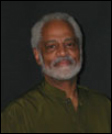 Troy Duster, PhD, Silver Professor of Sociology and Director of the Institute for the History of the Production of Knowledge, New York University; Chancellor's Professor, University of California, Berkeley.
Troy Duster, PhD, Silver Professor of Sociology and Director of the Institute for the History of the Production of Knowledge, New York University; Chancellor's Professor, University of California, Berkeley.
Troy Duster is Silver Professor of Sociology and Director of the Institute for the History of the Production of Knowledge at New York University -- and he also holds an appointment as Chancellor's Professor at the University of California, Berkeley. From 1996-98, he served as member and then chair of the joint NIH/DOE advisory committee on Ethical, Legal and Social Issues in the Human Genome Project (The ELSI Working Group). He is the past-president of the American Sociological Association (2004-2005), a member of the Board of Advisors of the Social Science Research Council, and in 2003-2004 served as chair of the Board of Directors of the Association of American Colleges and Universities. He is the former Director of the American Cultures Center and the Institute for the Study of Social Change, both at the University of California, Berkeley.
His relevant books and monographs include Cultural Perspectives on Biological Knowledge (co-edited with Karen Garrett), Backdoor to Eugenics, (2nd ed, 2003) and Whitewashing Race: The Myth of a Colorblind Society (co-author Brown, et al., 2003). Most recent publications include, "Comparative Perspectives and Competing Explanations: Taking on the Newly Configured Reductionist Challenge to Sociology," American Sociological Review, 2006, 71 (February:1-15); "Behavioral Genetics and Explanations of the Link between Crime, Violence, and Race, in E. Parens, A.R. Chapman and N. Press, eds., Wrestling with Behavioral Genetics: Science, Ethics, and Public Conversation, Baltimore: Johns Hopkins University Press, 2006; "Deep Roots and Tangled Branches," Chronicle of Higher Education, (3 February 2006) B13; "Feedback Loops in the Politics of Knowledge Production," in Nico Stehr, ed., The Governance of Knowledge, New Brunswick and London, 2004, 139-160; "Selective Arrests, An Ever-Expanding DNA Forensic Database, and the Specter of an Early Twenty-First Century Equivalent of Phrenology" in David Lazer, ed., DNA and the Criminal Justice System: The Technology of Justice, 2004, 315-334; "Controversies in Biomedical, Behavioral and Forensic Science," with P. Ossorio, American Psychologist, 60, 1, 115-128, January, 2005; "The Hidden Eugenic Potential of Germ-Line Interventions," in Audrey R. Chapman and Mark S. Frankel, Designing our Descendants: The Promises and Perils of Genetic Modifications, Baltimore and London: The Johns Hopkins University Press, 2003, 156-178; "Buried Alive: The Concept of Race in Science," in Alan H. Goodman, Deborah Heath, and M. Susan Lindee, eds., Genetic Nature / Culture: Anthropology and Science Beyond the Two-Culture Divide, Berkeley and London: University of California Press, 2003, 258-277; "The Sociology of Science and the Revolution in Molecular Biology," in J. Blau, ed., Blackwell Companion to Sociology," 2001, "Social Side Effects of the New Human Molecular Genetic Diagnostics," in Michael Yudell and Robert DeSalle, eds., The Genomic Revolution: Unveiling the Unity of Life, Washington, DC: John Henry Press, 2002; "Race Identity," in International Encyclopedia of the Social & Behavioral Sciences, N. J. Smelser and Paul B. Baltes (eds.), Pergamon, Oxford. 2001: 12703-06; The Johns Hopkins University Press, 2003, 156-178; and "The Morphing Properties of Whiteness," in B. Rasmussen, E. Klinenberg, I. Nexica and M. Wray, eds., The Making and Unmaking of Whiteness, Durham, NC: Duke University Press, 2001.
|
 Celia B. Fisher, PhD, Marie Ward Doty Professor of Psychology, Director of the Fordham University Center for Ethics Education; Chair of EPA Human Research Subjects Board.
Celia B. Fisher, PhD, Marie Ward Doty Professor of Psychology, Director of the Fordham University Center for Ethics Education; Chair of EPA Human Research Subjects Board.
Celia B. Fisher, Ph.D., Marie Ward Doty Professor of Psychology and Director of the Fordham University Center for Ethics Education is Chair of the Environmental Protection Agency's Human Research Subjects Board, a past member of the DHHS Secretary's Advisory Committee on Human Research Protections (SACHRP) and a founding editor of the journal Applied Developmental Science. She chaired the American Psychological Association's Ethics Code Task Force and the New York State Licensing Board for Psychology and served on the National Institutes of Mental Health Data Safety and Monitoring Board, and the Institute of Medicine's Committee on Clinical Research Involving Children. Dr Fisher is author of Decoding the Ethics Code: A Practical Guide for Psychologists (Sage Publications), co-editor of 7 books including The handbook of ethical research with ethnocultural populations and communities. (Sage Publications), and author of over 100 theoretical and empirical publications in the areas of ethics in medical and social science research and practice and life span development. Her federally funded research programs focus on ethical issues and well-being of vulnerable populations including ethnic minority youth and families, active drug users, college students at risk for drinking problems, and adults with impaired consent capacity.
|
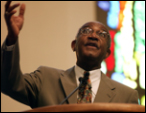 The Rev. Dr. James Forbes, President, Healing of the Nations Foundation; Senior Minister Emeritus of the Riverside Church.
The Rev. Dr. James Forbes, President, Healing of the Nations Foundation; Senior Minister Emeritus of the Riverside Church.
The Rev. Dr. James Alexander Forbes, Jr. is President of the Healing of the Nations Foundation, Senior Minister Emeritus of The Riverside Church, and host of "The Time Is Now" on Air America Radio.
Dr. Forbes was the first African-American to serve as Senior Minister of one of the largest multicultural congregations in the nation. The 2,400-member church, built by John D. Rockefeller Jr. in 1927, is affiliated with the American Baptist Churches and the United Church of Christ.
Before being called to Riverside's pulpit in 1989, Dr. Forbes served from 1976-1985 as the Brown and Sockman Associate Professor of Preaching at Union Theological Seminary in New York City. From 1985-1989 he was Union's first Joe R. Engle Professor of Preaching. Union named him the first Harry Emerson Fosdick Adjunct Professor of Preaching in 1989, when he accepted the pastorate at Riverside. Dr. Forbes also serves on the Core Teaching Staff at Auburn Theological Seminary in New York.
Dr. Forbes is known as the preacher's preacher. In their March 4, 1996 issue, Newsweek recognized Forbes as one of the 12 "most effective preachers" in the English-speaking world. Dr. Forbes, a pastor, educator, administrator, community activist and interfaith leader, was designated as one of America's greatest Black preachers by Ebony in 1984 and 1993. He won the Alumni Charter Day Award of Howard University for Distinguished Post Graduate Achievement In Ministry. In 1995 he emerged in the Baylor University Survey as one of twelve remarkable and most effective preachers in the English-speaking world.
Dr. Forbes has earned three degrees and has been awarded 13 honorary degrees. Among his numerous accolades, Dr. Forbes was asked to speak on behalf of the progressive faith community at the Democratic National Convention in 2004.
|
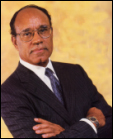 Harold P. Freeman, MD, President and Founder of the the Ralph Lauren cancer Center, Harlem NY, Senior Advisor to the Director of the National Cancer Institute.
Harold P. Freeman, MD, President and Founder of the the Ralph Lauren cancer Center, Harlem NY, Senior Advisor to the Director of the National Cancer Institute.
Harold P. Freeman, M.D., is President and Founder of the Ralph Lauren Center for Cancer Care and Prevention in New York, New York. Dr. Freeman is also Senior Advisor to the Director of the National Cancer Institute (NCI), Bethesda, Maryland. He is a Professor of Clinical Surgery at Columbia University College of Physicians and Surgeons, also in New York. For twenty-five years (1974-1999), Dr. Freeman was Director of Surgery at Harlem Hospital in New York.
Dr. Freeman was Founding Director of the National Cancer Institute (NCI) Center to Reduce Cancer Health Disparities for a five-year period ending in 2005. During that time period, he served as Associate Director of the NCI.
Dr. Freeman is a diplomat of the American Board of Surgery and a fellow of the American College of Surgeons. He has been medical director of the Breast Examination Center of Harlem, a program of Memorial Sloan-Kettering Cancer Center, since 1979.
Dr. Freeman was elected to membership in the Institute of Medicine of the National Academy of Sciences in 1997.
Dr. Freeman served as national president of the American Cancer Society from 1988-1989. He is the chief architect of the American Cancer Society's initiative on Cancer in the Poor and is a leading authority on the interrelationships between race, poverty, and cancer. The Society established the "Harold P. Freeman Award" in 1990 to recognize his work in this area. This award is presented annually by American Cancer Society divisions throughout the U.S. to individuals who have made outstanding contributions to the fight against cancer in the poor.
Dr. Freeman pioneered the "Patient Navigation Program" which addresses disparities in access to treatment, particularly among poor and uninsured people. This program is designed to assist medically underserved patients in navigating their way through a complex health system by overcoming barriers to timely diagnosis and treatment of cancer. The success of Dr. Freeman's "Patient Navigation Program" has led many other health care organizations to adopt similar initiatives. Based on this model the Patient Navigator and Chronic Disease Prevention Act was signed into law by President Bush in June 2005.
Dr. Freeman is past chairman of the President's Cancer Panel, to which he was appointed for four consecutive three-year terms, first by President Bush in 1991 and subsequently by President Clinton in 1994, 1997 and 2000.
As a graduate of Catholic University of America, Dr. Freeman received the Harris Award for "Outstanding Scholar, Gentleman, and Athlete." He later was recognized as "Outstanding Alumnus in the Medical Arts" at Catholic University and was inducted into the Athlete's Hall of Fame of the University. Additionally, he received the Daniel Hale Williams Award for Outstanding Achievements as Chief Resident at Howard University Hospital.
Honorary Doctor of Science degrees have been awarded to Dr. Freeman from Albany Medical College, Niagara University, Adelphi University, and Catholic University of America. He was also awarded the University of California at San Francisco Medal. Other selected awards include: The Mary Lasker Award for Public Service; the Time, Inc. International Health and Medical Media Awards' Lifetime Achievement Award; the American Cancer Society's Medal of Honor; the CDC Foundation's Champion of Prevention Award; the Breast Cancer Research Foundation's "Jill Rose Award," the American Society of Clinical Oncology's Special Recognition Award; the Avon Breast Cancer National Leadership Award; the Susan G. Komen Breast Cancer National Foundation's Betty Ford Award; the International Spirit of Life Foundation and the Washington Cancer Institute's Spirit of Life Award; the Mayo Clinic Charles G. Moertel Memorial Lectureship Award; the Association of Community Cancer Centers' Achievement Award; the George Washington University Cancer Institute's Distinguished Public Service Award; the Rudin Prize in Medicine and Health; the 2006 Black History Makers Award of The Associated Black Charities; The Dorothy Height Life Time Achievement Award and The First Annual Medical Assembly "Humanitarian Award" at the United Nations Meeting the Global Challenge of Cancer in New York City.
At the Centennial Meeting of the American Association for Cancer Research (AACR) held in Los Angeles on April 15, 2007 Dr. Freeman received two awards: "The Public Service Award" presented to him by the President of AACR during the opening ceremony and "The 2nd Annual Minorities in Cancer Research--Jane Wright Lectureship Award". He delivered the "Jayne Wright Lecture".
|
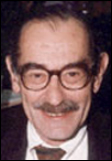 Kurt Hirschhorn, M.D., Professor of Pediatrics, Genetics and Genomic Sciences, and Medicine, Chairman Emeritus, Pediatrics, Mount Sinai School of Medicine
Kurt Hirschhorn, M.D., Professor of Pediatrics, Genetics and Genomic Sciences, and Medicine, Chairman Emeritus, Pediatrics, Mount Sinai School of Medicine
Dr. Kurt Hirschhorn received his MD degree in 1954 from New York University School of Medicine. He was elected to both Phi Beta Kappa and Alpha Omega Alpha. He served his residency in internal medicine at Bellevue Hospital, New York, and remained there as a Fellow in Metabolic Diseases and then had a Fellowship in Human Genetics in Uppsala, Sweden. He became Assistant Professor and then Associate Professor of Medicine at New York University School of Medicine. He became Professor of Pediatrics at Mount Sinai School of Medicine in New York in 1966 where he established a new Medical Genetics Program. In 1977, he became the Herbert H. Lehman Professor and Chairman of the Department of Pediatrics at Mount Sinai School of Medicine and Pediatrician in Chief at Mount Sinai Hospital. In 1995, he stepped down from the chairmanship and returned to research in human genetics as a Professor of Pediatrics, Human Genetics and Medicine.
His work in genetics began with studies of the genetics of hypercholesterolemia and other lipid disorders. While in Sweden, he began to work in tissue culture genetics and cytogenetics, activities which he has sustained to this day. Although the name Wolf Hirschhorn Syndrome derives from the back to back publication with Dr. Wolf's paper published in 1965, Dr. Hirschhorn first published this entity in the Mammalian Chromosome Newsletter (4:14, 1961). At Mount Sinai he began to work on several aspects of biochemical genetics and more recently in molecular genetics. In the early 1960s, he discovered the in vitro response of peripheral blood lymphocytes to antigens and the mixed lymphocyte reaction which was one of the major beginnings of the field of cellular immunology and immunogenetics. He has made a number of contributions to the field of primary immunodeficiency.
Dr. Hirschhorn is a member of many societies, including the American Society of Human Genetics (President, 1969), Harvey Society (President, 1980), American Society for Clinical Investigation, Association of American Physicians, American Pediatric Society, American Association of Immunologists and the Institute of Medicine of the National Academy of Sciences. He has served or is currently serving on the Editorial Boards or Committees of 21 journals including Blood, American Journal of Human Genetics, American Journal of Reproductive Immunology, and Journal of Cellular Immunology. He has served as a Consultant or Member of the Advisory Board of the NIH, the National Foundation March of Dimes Basic Sciences Research Committee (Chairman) and the American Cancer Society (Council). He received the Rudolph Virchow Medal in 1974, the Solomon A. Berson Medical Alumni Achievement Award from New York University School of Medicine in 1982, the Jacobi Medallion from Mount Sinai Medical Center in 1993, the William Allan Award (1995) and the Award for Excellence in Human Genetics Education (2002) from the American Society of Human Genetics, The Colonel Harland Sanders Lifetime Achievement Award in Genetics from the March of Dimes in 2006, and The John Howland Award for Distinguished Service to Pediatrics, The American Pediatric Society in 2006.
Dr. Hirschhorn continues to be actively involved in research and in the clinical practice of medical genetics. His work includes research and application of the various subdisciplines of genetics including cytogenetics, biochemical genetics, molecular genetics and immunogenetics. He is one of the founding members of The Hastings Center for Biomedical Ethics. He has published more than 400 articles and book chapters.
|
 Sharon Kardia, PhD, Associate Professor of Epidemiology, Director of Public Health Genetics Program, University of Michigan School of Public Health.
Sharon Kardia, PhD, Associate Professor of Epidemiology, Director of Public Health Genetics Program, University of Michigan School of Public Health.
Dr. Kardia is an Associate Professor of Epidemiology at the University of Michigan. She is Director of the Public Health Genetics Program, Co-Director of the Michigan Center for Genomics and Public Health, and Co-Director of the Life Sciences & Society Program housed in the University of Michigan School of Public Health.
Dr. Kardia received her doctoral degree in human genetics from the University of Michigan, was a post-doctoral fellow in the Department of Microbiology and Immunology and continued post-doctoral work in the Department of Human Genetics. She joined the faculty of the University of Michigan School of Public Health in 1998.
Dr. Kardiaís main research interests are in the genomic epidemiology of cardiovascular disease and its risk factors. She is particularly interested in gene-environment, gene-gene interactions, and in modeling complex relationships between genetic variation, environmental variation, and risk of common chronic diseases. Her work also includes using gene expression and proteomic profiles for molecular classification of tumors and survival analysis in lung and ovarian cancers. As a part of her Center activity, Dr. Kardia is also actively working on moving genetics into chronic disease programs in state departments of health.
|
 Nancy Krieger, PhD, Professor, Department of Society, Human Development, and Health, Harvard School of Public Health.
Nancy Krieger, PhD, Professor, Department of Society, Human Development, and Health, Harvard School of Public Health.
Nancy Krieger is Professor of Society, Human Development, and Health at the Harvard School of Public Health, Associate Director of the Harvard Center for Society and Health, and Co-Director of the HSPH Interdisciplinary Concentration on Women, Gender, and Health. She received her PhD in Epidemiology from the University of California at Berkeley in 1989. Dr. Krieger is a social epidemiologist, with a background in biochemistry, philosophy of science, and the history of public health, combined with 25 years of experience as an activist in issues involving social justice, science, and health. Her work focuses on three aspects of social inequalities in health: (a) etiologic studies on the determinants of health inequities, (b) methods for improving monitoring of social inequalities in health, and (c) development of theoretical frameworks, including ecosocial theory, to guide work on understanding and addressing health disparities. Examples of her empirical work include: research on racism, discrimination and health, including blood pressure and birth outcomes; socioeconomic and racial/ethnic disparities in breast cancer; and research on appropriate measures of social class (individual, household, and neighborhood), especially for population-based monitoring of social inequalities in health and also for studying women, gender, class, and health. Other work concerns history and politics of epidemiology and public health, including study and critique of theories that epidemiologists and others use to explain population patterns of health, disease, and well-being. She is editor of Embodying Inequality: Epidemiologic Perspectives (Baywood Press, 2004) and co-editor, with Glen Margo, of AIDS: The Politics of Survival (Baywood Publishers, 1994), and, with Elizabeth Fee, of Women's Health, Politics, and Power: Essays on Sex/Gender, Medicine, and Public Health (Baywood Publishers, 1994). In 1994 she co-founded, and still chairs, the Spirit of 1848 Caucus o f the American Public Health Association, which is concerned with the links between social justice and public health.
|
 Harry G. Levine, PhD, Professor Sociology, Queens College and the Graduate Center, City University of New York.
Harry G. Levine, PhD, Professor Sociology, Queens College and the Graduate Center, City University of New York.
Harry G. Levine is Professor of Sociology at Queens College and the Graduate Center, City University of New York. He received his PhD from the University of California, Berkeley, and for most of his professional career has done research on the sociology, history and anthropology of drug and alcohol topics. He has received The Gustavus Meyers Outstanding Book Award (for Crack in America), the Mencken Award For Outstanding Journalism (for "The Politics of America's Latest Drug Scare"), and The Mark Keller Award for Scholarly Excellence (for "The Discovery of Addiction"). His research has been supported by grants from the National Institute on Alcohol Abuse and Alcoholism, the National Endowment for the Humanities, the Michael Harrington Center, the Drug Policy Foundation, and, most recently, the Open Society Foundation. His current research focuses on racial bias in the policing of misdemeanor arrests, especially for the lowest-level marijuana possession arrests.
His recent publications include: Crack in America: Demon Drugs and Social Justice, Univ. California Press, 1979; "Alcohol Prohibition and Drug Prohibition" in Drugs and Society: U.S. Public Policy. Roman and Littlefield, 2005; "Crack in the Rearview Mirror: Deconstructing Drug War Mythology." Social Justice, Vol. 31, 2004; "Global Drug Prohibition: Its Uses and Crises" International Journal of Drug Policy. Vol 14., 2003. His publications are frequently co-authored with Craig Reinarman and have been posted on numerous web sites. His May, 2007, "Testimony before hearings of the New York State Assembly on proposed legislation to collect DNA from all people convicted of misdemeanors" and other works are available at his academic web site at: http://soc.qc.cuny.edu/Staff/levine/.
|
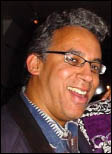 Josť F. Morales, PhD, Rockefeller University, Public Interest Biotechnology.
Josť F. Morales, PhD, Rockefeller University, Public Interest Biotechnology.
Josť F. Morales Ph.D. is a Puerto Rican that was born and raised in the Bronx, New York. He obtained his BS in biology from Haverford College. Dr. Morales was a community activist in the NYC Latino community. As an early Environmental Justice activist, he co-founded the Toxic Avengers in Williamsburg, Brooklyn, the NYC Environmental Justice Alliance and the North East Environmental Justice Network. He was active in the 1st People of Color Environmental Leaderships Summit, the NIEHS Symposium on Health Research Needs to Assure Environmental Justice. Dr. Morales presented a Biotech Policy paper in the 2nd People of Color Environmental Leadership Summit. Dr. Morales obtained his Ph.D. in Environmental Oncology from New York University doing research at UC San Francisco. Dr. Morales started the organization Public Interest Biotechnology to examine Environmental Justice and biotechnology. Dr. Morales is a member of the Environmental Mutagen Society and is currently conducting genomics research at Rockefeller University.
|
 Peter Neufeld, JD, Co-founder and Co-director of The Innocence Project; Cochran Neufeld & Scheck, LLP.
Peter Neufeld, JD, Co-founder and Co-director of The Innocence Project; Cochran Neufeld & Scheck, LLP.
Peter Neufeld co-founded and co-directs The Innocence Project, an independent non- profit affiliated with the Benjamin N. Cardozo School of Law. He is also a partner in the civil rights law firm Cochran Neufeld & Scheck, LLP.
Before co-founding the Innocence Project at Cardozo Law School, he taught trial advocacy at Fordham University Law School and was a staff attorney with the Legal Aid Society of New York. For the last decade he has served on the New York State Commission on Forensic Science, with responsibility for regulating all state and local crime laboratories. He has published more than a dozen articles on science and law, and is the co-author, along with Jim Dwyer and Barry Scheck of the book entitled, Actual Innocence: When Justice Goes Wrong And How To Make It Right.
A 1972 graduate of the University of Wisconsin, Peter Neufeld received his law degree in 1975 from New York University School of Law. You can read about the Innocence Project at http://www.innocenceproject.org/.
|
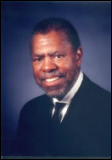 Kenneth Olden, Ph.D., Sc.D., Former Director, National Institute of Environmental Health Sciences and the National Toxicology Program, National Institutes of Health, DHHS.
Kenneth Olden, Ph.D., Sc.D., Former Director, National Institute of Environmental Health Sciences and the National Toxicology Program, National Institutes of Health, DHHS.
Kenneth Olden, Ph.D., Sc.D., L.H.D., is the most recent past Director of the National Institute of Environmental Health Sciences (NIEHS), National Institutes of Health (NIH), and the National Toxicology Program (NTP) in the U.S. Department of Health and Human Services. He held these positions from 1991 to 2005. He was the first African-American to become Director of one of the 18 institutes in the history of the agency. He has returned full time to his research position as Chief of the Metastasis Section, Laboratory of Molecular Carcinogenesis at the NIEHS, which he also held while director. He is presently the Yerby Visiting Professor at the Harvard School of Public Health.
Dr. Olden received his Ph.D. degree in Cell Biology/Biochemistry from Temple University. He is the recipient of several honorary degrees; namely, Sc.D. degrees from Metropolitan University, San Juan, Puerto Rico, the University of Medicine and Dentistry of New Jersey; the University of Rochester; and an Honorary Doctorate of Science from Tulane University. He also holds an honorary L.H.D. from the college of Charleston. After completing his Ph.D. degree, he was a Research Fellow and Instructor of Physiology at Harvard University (1970-1974), a Senior Staff Fellow and then a Research Biologist at the Laboratory of Molecular Biology, Division of Cancer Biology and Diagnosis, National Cancer Institute, NIH, Bethesda, MD (1974-1979), Associate Director for Research, Howard University Cancer Center, and Associate Professor of Oncology, Howard University Medical School, Washington, DC (1979-1982), Professor of Oncology and Deputy Director Howard University Cancer Center (1982-1985) and Director (1985-1991), and Professor and Chair of the Department of Oncology (1985-1991).
His honors and awards are too numerous to detail, but among them are: the Toxicology Forum's Distinguished Fellow Award, the Presidential Distinguished Executive Rank Award and the Presidential Meritorious Executive Rank Award by former President Clinton for sustained extraordinary accomplishments, the HHS Secretary's Distinguished Service Award, the American College of Toxicology's First Distinguished Service Award, the National Minority Health Leadership Award (2005), Honorary Doctorate from Tulane University (2006), and an invited participant in the International Conference on "Disaster Prevention and Mitigation" sponsored by the Harvard School of Public Health (2006). He was unique among Institute Directors in that he was awarded three of the most prestigious awards in Public Health: The Calver Award (2002), the Sedgwick Medal (2004), and the Julius B. Richmond Award (2005). He was elected to membership in the Institute of Medicine, National Academy of Sciences, in 1994; and appointed Member of the Visiting Committee, Board of Overseers, Harvard College (2007-2010). He is on the editorial board of numerous journals, serving in most instances as Associate Editor. He has been cited in Current Contents, Life Sciences for having published two of the 100 most-cited papers in 1978-79, one of which was subsequently designated as a "citation classic." Over 28 visiting fellows or post-docs have trained in his laboratory, and he has published over 125 manuscripts in peer-reviewed journals. In addition, Dr. Olden has published more than 45 review articles and book chapters.
He has chaired/co-chaired numerous national/international meetings, and has been an invited speaker, keynote speaker at over 150 symposia seminars, etc.
Since resigning as Director of NIEHS/NTP in 2005, Dr. Olden has been very active as an advisor to non-profit foundations. These include the following:
- Michael J. Fox Foundation for Parkinson's Research
- Avon Breast Cancer Foundation
- Institute for Public Health and Water Research (IPWR)
- Scientific and Medical Accountability Standards Working Group, California Stem Cell Initiative
- Society of Toxicology, Science Strategy Committee
- Robert Wood Johnson Foundation Health & Society Scholars Program
- Research Triangle Environmental Health Collaborative
- Coalition for Safe Minds
|
 Dorothy Roberts, JD, Kirkland & Ellis Professor, Northwestern University School of Law; faculty fellow, Institute for Policy Research.
Dorothy Roberts, JD, Kirkland & Ellis Professor, Northwestern University School of Law; faculty fellow, Institute for Policy Research.
Dorothy Roberts is the Kirkland & Ellis Professor at Northwestern University School of Law, with joint appointments in the Departments of African American Studies and Sociology, and as a faculty fellow of the Institute for Policy Research. She has written and lectured extensively on the interplay of gender, race, and class in legal issues concerning reproduction, bioethics, and child welfare. She is the author of the award-winning Killing the Black Body: Race, Reproduction, and the Meaning of Liberty (1997) and Shattered Bonds: The Color of Child Welfare (2002) and a frequent speaker at university campuses, social justice organizations, and other public forums. Professor Roberts has been a visiting professor at the University of Pennsylvania and Stanford, a fellow at Harvard University's Program in Ethics and the Professions, and a Fulbright scholar at the Centre for Gender and Development Studies in Trinidad &Tobago, where she conducted research on gender, sexuality, and HIV/AIDS in the Caribbean. She serves as a member of the board of directors of the Black Women's Health Imperative and the National Coalition for Child Protection Reform and the executive committee of Cells to Society: The Center on Social Disparities and Health. She recently received a National Science Foundation grant to study race consciousness in biotechnology, law, and social policy.
|
 Charmaine Royal, PhD, Associate Research Professor, Institute for Genome Sciences and Policy, Duke University.
Charmaine Royal, PhD, Associate Research Professor, Institute for Genome Sciences and Policy, Duke University.
Charmaine D. M. Royal is a newly appointed Associate Research Professor in the Institute for Genome Sciences and Policy (IGSP) at Duke University. Prior to joining the IGSP, she was Assistant Professor in the Department of Pediatrics and Child Health and Director of the GenEthics Unit in the National Human Genome Center, Howard University College of Medicine. Dr. Royal received her B.S. in Microbiology, M.S. in Genetic Counseling, and Ph.D. in Human Genetics from Howard University. She subsequently completed a post-doctoral fellowship in the Bioethics and Special Populations Research Program of the National Human Genome Research Institute at the National Institutes of Health.
Her primary research interests include the implications of human genetics/genome research for African Americans and other African Diaspora populations, as well as the intersections among "race", genomics, identity, and health. She has presented, published, and received funding in these areas.
Dr. Royal is a member of several professional organizations. She also serves on a number of professional committees and boards including the: Social Issues Committee of the American Society of Human Genetics; Editorial Board of the American Journal of Bioethics; Bioethics Advisory Committee of the March of Dimes Foundation; Membership, Diversity and Outreach Working Group of the National Coalition for Health Professional Education in Genetics; and the Cultural Competency Advisory Committee of the National Medical Association.
|
 Makani Themba-Nixon, Executive Director of The Praxis Project.
Makani Themba-Nixon, Executive Director of The Praxis Project.
Makani Themba-Nixon is Executive Director of The Praxis Project, a nonprofit organization helping communities use media and policy advocacy to advance health equity and justice.
She was previously director of the Grass Roots Innovative Policy Program (GRIPP) a national project to build capacity among local organizing groups to engage policy advocacy to address institutional racism in welfare and public education. Makani served as staff for the California State Legislature, media director for the Southern Christian Leadership Conference/Los Angeles, and worked five years for the Marin Institute for the Prevention of Alcohol and Other Drug Problems including three years as director of its Center for Media and Policy Analysis.
Makani has published numerous articles and case studies on race, media, policy advocacy and public health. She is co-author of Media Advocacy and Public Health: Power for Prevention, a contributor to the volumes We the Media, State of the Race: Creating Our 21st Century, along with many other edited book projects.
She authored Making Policy, Making Change, which examines media and policy advocacy for public health through case studies and practical information. Her latest book, co-authored with Hunter Cutting, is Talking the Walk: Communications Guide for Racial Justice.
|
|
|
|


 Kwame Anyane-Yeboa, MD, Professor of Clinical Pediatrics, New York Presbyterian Hospital Department of Clinical Genetics.
Kwame Anyane-Yeboa, MD, Professor of Clinical Pediatrics, New York Presbyterian Hospital Department of Clinical Genetics.
 Jamie D. Brooks, JD, Project Director on Race, Health and Justice, Center for Genetics and Society.
Jamie D. Brooks, JD, Project Director on Race, Health and Justice, Center for Genetics and Society. Troy Duster, PhD, Silver Professor of Sociology and Director of the Institute for the History of the Production of Knowledge, New York University; Chancellor's Professor, University of California, Berkeley.
Troy Duster, PhD, Silver Professor of Sociology and Director of the Institute for the History of the Production of Knowledge, New York University; Chancellor's Professor, University of California, Berkeley.
 Celia B. Fisher, PhD, Marie Ward Doty Professor of Psychology, Director of the Fordham University Center for Ethics Education; Chair of EPA Human Research Subjects Board.
Celia B. Fisher, PhD, Marie Ward Doty Professor of Psychology, Director of the Fordham University Center for Ethics Education; Chair of EPA Human Research Subjects Board.
 The Rev. Dr. James Forbes, President, Healing of the Nations Foundation; Senior Minister Emeritus of the Riverside Church.
The Rev. Dr. James Forbes, President, Healing of the Nations Foundation; Senior Minister Emeritus of the Riverside Church.
 Harold P. Freeman, MD, President and Founder of the the Ralph Lauren cancer Center, Harlem NY, Senior Advisor to the Director of the National Cancer Institute.
Harold P. Freeman, MD, President and Founder of the the Ralph Lauren cancer Center, Harlem NY, Senior Advisor to the Director of the National Cancer Institute.
 Kurt Hirschhorn, M.D., Professor of Pediatrics, Genetics and Genomic Sciences, and Medicine, Chairman Emeritus, Pediatrics, Mount Sinai School of Medicine
Kurt Hirschhorn, M.D., Professor of Pediatrics, Genetics and Genomic Sciences, and Medicine, Chairman Emeritus, Pediatrics, Mount Sinai School of Medicine
 Sharon Kardia, PhD, Associate Professor of Epidemiology, Director of Public Health Genetics Program, University of Michigan School of Public Health.
Sharon Kardia, PhD, Associate Professor of Epidemiology, Director of Public Health Genetics Program, University of Michigan School of Public Health.
 Nancy Krieger, PhD, Professor, Department of Society, Human Development, and Health, Harvard School of Public Health.
Nancy Krieger, PhD, Professor, Department of Society, Human Development, and Health, Harvard School of Public Health.
 Harry G. Levine, PhD, Professor Sociology, Queens College and the Graduate Center, City University of New York.
Harry G. Levine, PhD, Professor Sociology, Queens College and the Graduate Center, City University of New York.
 Josť F. Morales, PhD, Rockefeller University, Public Interest Biotechnology.
Josť F. Morales, PhD, Rockefeller University, Public Interest Biotechnology.
 Peter Neufeld, JD, Co-founder and Co-director of The Innocence Project; Cochran Neufeld & Scheck, LLP.
Peter Neufeld, JD, Co-founder and Co-director of The Innocence Project; Cochran Neufeld & Scheck, LLP.
 Kenneth Olden, Ph.D., Sc.D., Former Director, National Institute of Environmental Health Sciences and the National Toxicology Program, National Institutes of Health, DHHS.
Kenneth Olden, Ph.D., Sc.D., Former Director, National Institute of Environmental Health Sciences and the National Toxicology Program, National Institutes of Health, DHHS.
 Dorothy Roberts, JD, Kirkland & Ellis Professor, Northwestern University School of Law; faculty fellow, Institute for Policy Research.
Dorothy Roberts, JD, Kirkland & Ellis Professor, Northwestern University School of Law; faculty fellow, Institute for Policy Research.
 Charmaine Royal, PhD, Associate Research Professor, Institute for Genome Sciences and Policy, Duke University.
Charmaine Royal, PhD, Associate Research Professor, Institute for Genome Sciences and Policy, Duke University.
 Makani Themba-Nixon, Executive Director of The Praxis Project.
Makani Themba-Nixon, Executive Director of The Praxis Project.